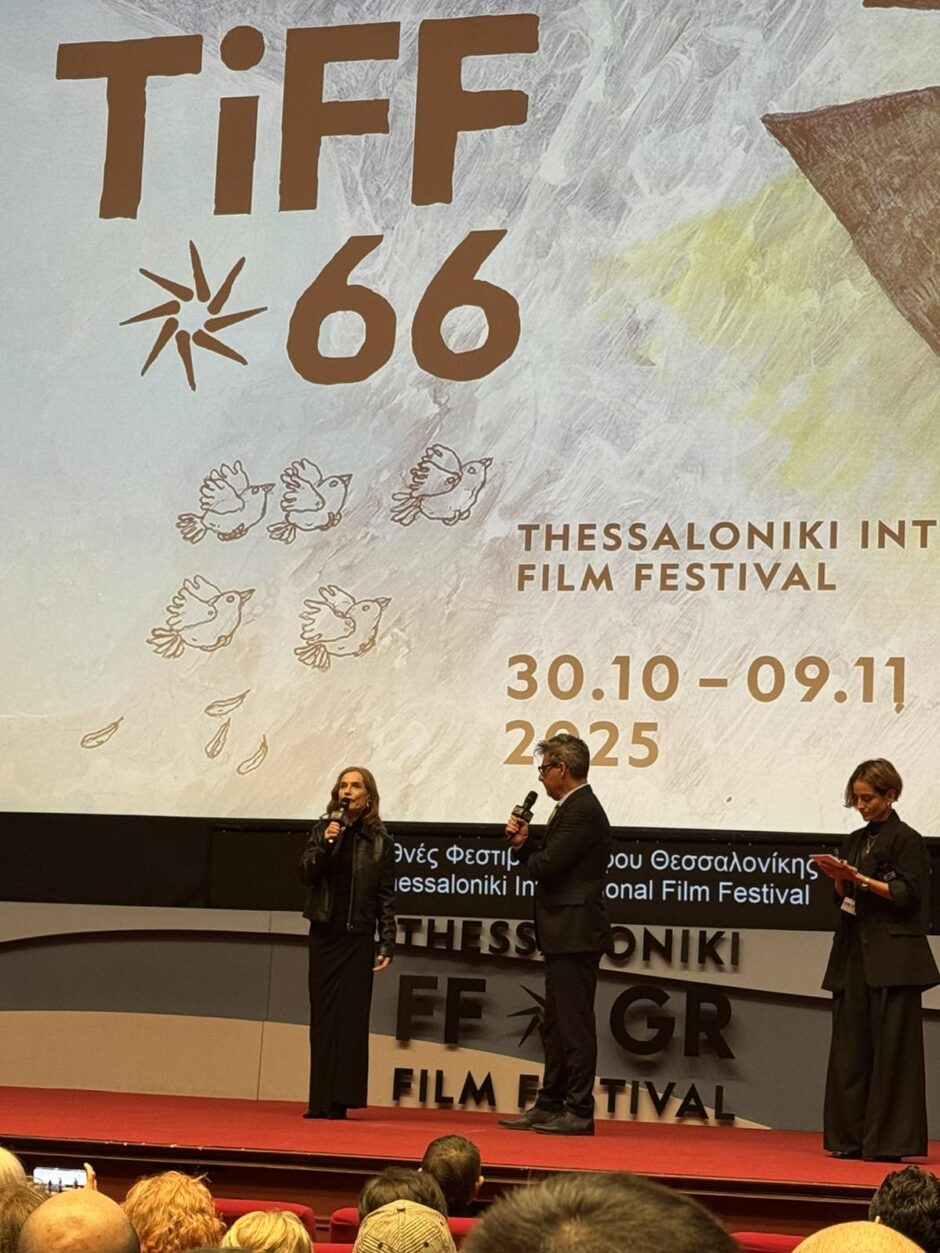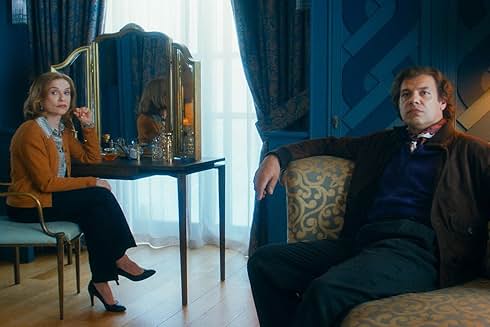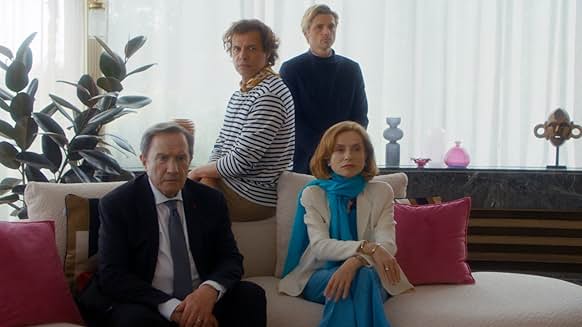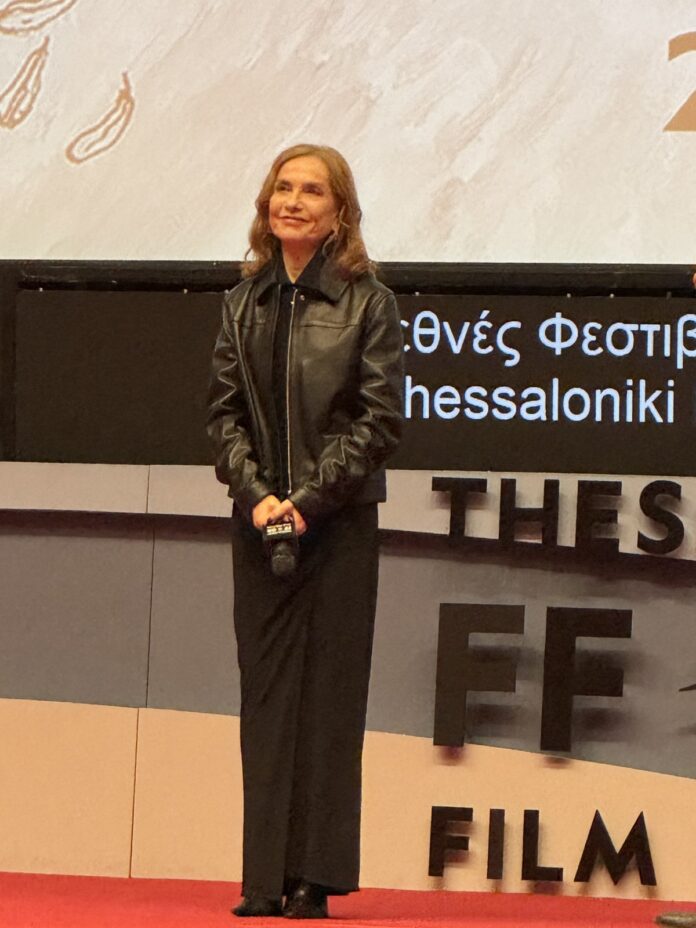Isabelle Huppert, one of the most iconic figures of the global cinematic scene, is the honorary guest of this year’s Thessaloniki Film Festival. A bold and multifaceted artist with a tremendous acting range, an exceptionally rich filmography spanning more than 120 film appearances, and countless awards from all major European film institutions and festivals has selected 15 of her most legendary films, which will be screened as part of the festival’s tribute in her honor.
Isabelle Ann Mardeleine Huppert, born on the 16th of March 1953 in Paris, France, is one of the most influential and charismatic actresses of her generation who stood out from the very beginning of her career, thanks to her remarkable ability to transform herself and to deliver a compelling performance in every role, as well as her distinctive talent of flawlessly embodying the persona of the icy, enigmatic heroine with ambiguous moral boundaries. Some of her most remarkable performances are those in the films “Voilette Noziere” (1978), “Story of Women” (1988), “The Piano Teacher” (2001) and “Elle” (2016), while her enviable and distinguished cinematic career includes collaborations with some of the greatest filmmakers in the world, such as Claude Chabrol, Michael Haneke, Jean-Luc Godard and the Taviani brothers.

The timeless star graced the fully attended Olympion Theater on Monday evening for the official premiere of one of her most recent films, “The Richest Woman in the World”. With her effortlessly charming yet captivating and imposing presence, Huppert was applauded by the audience who had gathered early at the historic cinema in the center of Thessaloniki. The actress introduced the film and discussed with the festival’s Artistic Director, Orestis Andreadakis. She revealed that part of the filming took place in Greece, specifically in Anavyssos, and clarified that this is not her most recent film, as the ever-active star has already completed three more movies since then!
The Richest Woman In The World (2025), directed by Thierry Klifa is based on the Bettencourt case, one of the biggest politico-economic scandals of modern France, incorporating numerous fictional elements. Huppert masterfully embodies the character of Marianne Farrere, an extremely wealthy heiress and owner of a cosmetics company. A powerful, calculating businesswoman with strong connections within the French political sphere, immense influence over the economic landscape and a fortune worth several billions; estranged and distant from her only daughter, Frederique, and seemingly unfulfilled in her relationship with her husband, Guy, her life is thrown into turmoil when she meets Pierre-Alain, a tempestuous, reckless young photographer and socialite.

The “comme il faut”, rational Marianne finds herself captivated by the dandy-style artist’s reckless, sinful and tumultuous lifestyle, and the two soon become inseparable. However, the peculiar friendship that develops between the two disparate personalities is far from selfless, as Pierre-Alain is slowly and strategically siphons off exorbitant amounts of money from the powerful yet unsuspecting and manipulated heiress,first arousing concern and then the outrage among her family and her loyal butler, Jerome- an outrage that eventually evolves into a series of relentless legal battles.
Centered on the relationship of exploitation and dependency between Marianne and Pierre-Alain, Klifa’s film exposes the pathologies, the underlying socio-political role and, also, the dark past of the French bourgeoisie, as is dares to address a deliberately forgotten chapter of the country’s recent history: the collaboration of many rich and notable French figures with the Nazis.

On a human and interpersonal level, the film also explores family relationships and dynamics, intra-family estrangement, and the lack of acceptance and understanding-particularly from mother to daughter-as well as loneliness and human incompleteness. Despite her apparent omnipotence and steely demeanor, Marianne often cries without knowing why, constantly feels sick, rarely laughs or enjoys herself and comes alive again only when she meets the grandiose Pierre-Alain, though it remains unclear whether she sees him as her closest friend or as her personal entertainer, a personal belonging of her that she chooses to fund because she can, because he is subservient to her and, ultimately, just another one of her employees.

